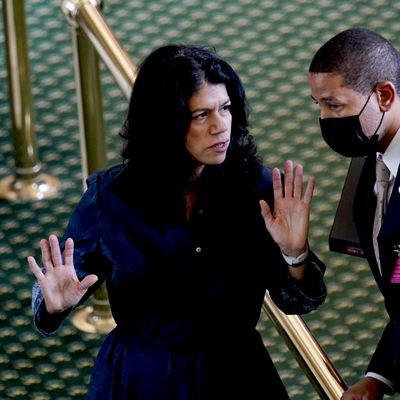
You have to hand it to Texas Democratic legislators. They may have very little power in their Republican-controlled state government, but their flair for drama is peerless. Until this week, Texas House Democrats had seized national attention by fleeing Austin to deny Republicans the quorum they needed to pass their version of the voter-suppression legislation that is the favorite project of GOP legislators everywhere. Their dilatory tactics stopped the bill from enactment during the regular legislative session and a special session; the lawmakers are now into their second special session. But yesterday it was Senate Democrats — and particularly one Senate Democrat, Carol Alvarado of Harris County (Houston) — who gained the spotlight with a 15-hour filibuster that ran all night.
As the Texas Tribune reports, the Texas legislature has very strict limitations on filibusters: They must not only involve actual talking, but talking with no respite:
Since before sunset Wednesday, state Sen. Carol Alvarado had been on her feet speaking, not allowed to sit or lean against her desk, on the Senate floor.
Unable to take bathroom breaks or drink water, she had worn a back brace, eyeglasses and running shoes and talked slowly behind a desk stacked with papers and with a microphone in her hand as she mounted a 15-hour filibuster. The target of her efforts was Senate Bill 1, the GOP’s priority bill that would place new restrictions on voting that many opponents say would disproportionately suppress ballots from voters of color and disabled voters.
Perhaps inhibited by the love for the filibuster exhibited by their allies in Congress, Republican legislative leaders didn’t try to interfere with Alvarado’s protest until, inevitably, she ran out of steam:
[U]ltimately, her speaking marathon could only delay the passage of the bill in the Republican-controlled Senate. Shortly after she finally stepped away from her desk around 9 a.m., the Senate voted to advance the measure on a 18-11 party-line vote.
It was appropriate that a Harris County Democrat led the fight against the legislation, since many of its provisions were aimed at that huge majority-minority jurisdiction’s liberal voting provisions instituted when the pandemic first raged, notably drive-thru and 24-hour voting:
Alvarado invoked her Houston constituents — the voters who took advantage of the voting options SB 1 would ban — and asked why they should not be allowed as many opportunities to vote as the county was willing to offer.
This rhetoric touting decentralized decision-making on election administration had to be a tad discomfiting to Republicans used to making the same arguments against election reforms enacted at the federal levels. But the political benefits of discouraging high levels of voting by Democratic-leaning young, Latino, and Black voters are just too rich for the GOP to resist. They will not, however, change the rules without a great deal of public exposure.
The Texas Senate made a few tweaks in their proposed law that voting-rights advocates proposed, including a “cure” provision for ballots with easily correctible technical errors, and a bit more time set aside for in-person early voting. But the big measures further reducing voting by mail (already difficult in Texas), beefing up voter-ID requirements, and cracking down on local accommodations for disabled or elderly, or simply working-class voters, are intact. The bill also ominously creates new protections for partisan poll watchers, often deployed by Republicans to intimidate minority voters.
With Senate passage of the new law, attention will shift back to the House and its truant Democrats, as the Washington Post observes: “Alvarado’s all-night filibuster came a day after Texas House Speaker Dade Phelan signed arrest warrants for 52 Democrats who failed to return during the fourth day of the House’s second special session, leaving the chamber eight members short of a quorum.”
The warrant was issued after the Texas Supreme Court cleared the way legally for that step by sweeping aside a lower-court ruling protecting the legislators from arrest. Earlier, House Democrats had flown en masse to Washington to urge the U.S. Senate to pass preemptive voting-rights legislation, but now a few of them have returned to the House floor in Austin. My colleague Ben Hart figures, “It’s probably only a matter of time before their quixotic efforts end in failure.” But they will go down fighting, and talking.






























